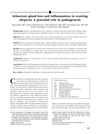Retinoid Metabolism Is Altered in Human and Mouse Cicatricial Alopecia
October 2012
in “
Journal of Investigative Dermatology
”

TLDR Altered retinoid metabolism in cicatricial alopecia suggests a balanced vitamin A diet may prevent the condition.
The study explored the connection between retinoid metabolism and cicatricial alopecia (CA) in both mice and humans. In mice, varying levels of dietary vitamin A affected the development and severity of CA, with increased retinoid metabolism components observed in mild cases and decreased in severe cases. Human patients with mild central centrifugal cicatricial alopecia (CCCA) showed similar increases, but these components were undetectable in severe cases and in pseudopelade. The study, which included feeding studies with mice and immunohistochemistry analysis of mouse and human tissue samples, concluded that a precise balance of dietary vitamin A is necessary due to the altered retinoid metabolism in CA. It suggests that future research should focus on finding the optimal vitamin A level to prevent CA and investigate the potential role of retinoid metabolism in its pathogenesis. The human part of the study involved 14 CCCA patients, 3 with pseudopelade, and 3 with nonalopecic dermatoses.





